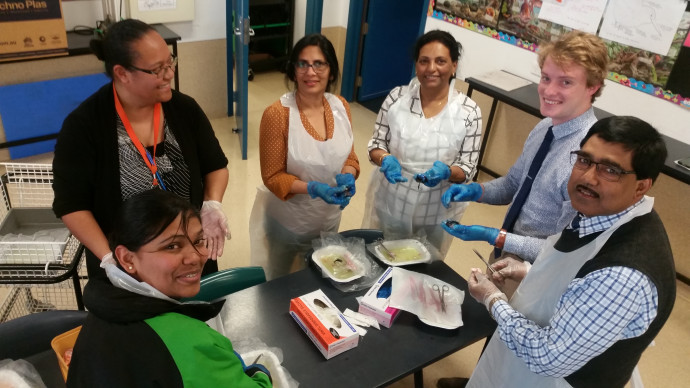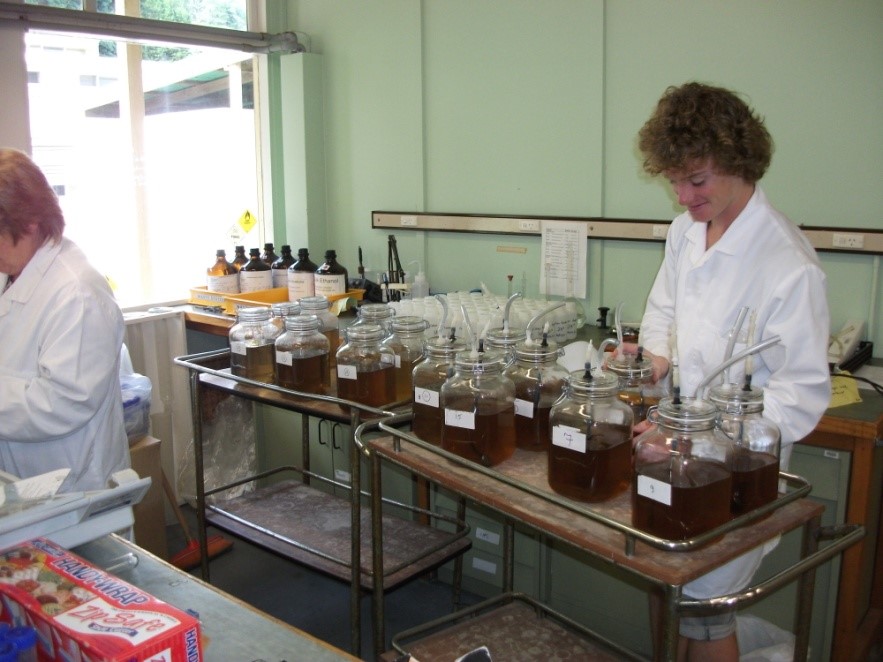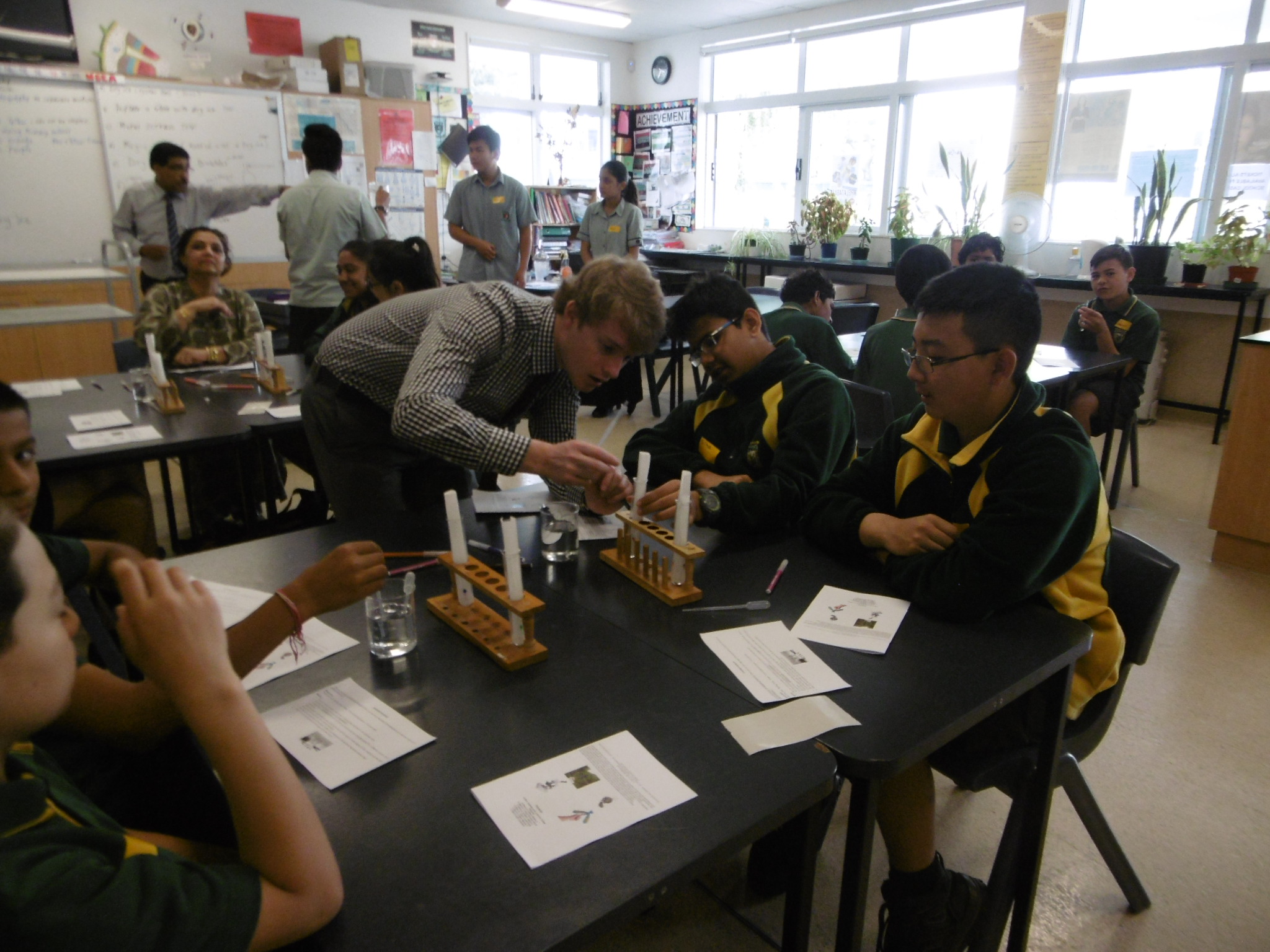Kieran Gainsford

Kieran has a passion for making chemistry more accessible for students across Aotearoa. He first became known to the Society when he was awarded a BayerBoost Scholarship in 2012. Now he works as a chemistry teacher at Aorere College in South Auckland and is undergoing a Masters of Education at the University of Auckland.
I suppose I was always going to end up interested in science. Right from when I was young, I remember flicking through kid-friendly science books, talking to my mum about her work at Scion (then known as the Forest Research Institute) and doing projects for school science fairs. In light of this, it’s hardly surprising that I have ended up sharing my love of science with a new generation of young people!
My first ‘real’ science experience was some contract work I did for the Department of Conservation in Rotorua when I was in year 11. I needed some money for an upcoming overseas school trip and I worked in the school holidays on data entry from some ecology surveys they were doing on islands in the Bay of Plenty. It was hardly thrilling stuff, but it did make me aware of the vastness of the modern scientific enterprise. There was so much data, and so many species I hadn’t even heard of! If this was just the data from one local area an hour from my home, I thought, then the amount of knowledge that science has yet to discover must be almost beyond imagining.
Following my final year at Rotorua Lakes High School, I was awarded a BayerBoost Scholarship, administered by Royal Society Te Apārangi. Under this programme, I carried out a research project at Scion on the treatment of wastewater effluent from a local pulp and paper mill. In contrast to my work at DoC, this was very hands-on. There were some big days of collecting the smelly samples from the site, plenty of laboratory-based analytical work and the completion of a report. It was a great taste of life in the laboratory and, more importantly, it opened my eyes to the importance of chemistry to us here in New Zealand. I hope that in a small way, this project contributed to our country’s critical knowledge about how to balance our economic development with protecting our environment.

Kieran on his BayerBoost Scholarship experience
My next step was off to the University of Auckland – along with a summer spent back at Scion in Rotorua – where a conjoint BSc/BA degree awaited. Here I studied chemistry, political studies and French. I get many comments about what an unusual combination of subjects this is. Of course, I chose them largely because I was interested in them; I wanted to know about how both the natural and social worlds worked. In many ways, it also reflected the fact that I didn’t know what I wanted to do with my life at that point. My message to today’s students is that this is totally fine! It may seem clichéd, but I still think you can’t go wrong in following your academic passions. The study of solid traditional disciplines will always be a fantastic foundation for future success, whether that is academia, applied postgraduate study, or directly into a career in the private or public sectors.
In my case, following an Honours year in politics, I was already missing chemistry! I was also very conscious of the opportunities I had been given, and wanted to give something back. Opportunities in the public service and the corporate world were available, but ultimately I thought that teaching would give me the best chance to combine my love of science with a desire to work with people. I was accepted into the Ako Mātātupu Teach First NZ programme in 2017. Unlike a traditional teaching diploma, this programme involves a few weeks of intensive on-campus learning followed by spending two years working as a teacher to earn your qualification. It was very much an “in the deep end” kind of experience, and, as with any new endeavour, I found my commitment to teaching as a career tested at times.
In the end, however, I have found teaching to be a hugely rewarding career choice. I am still teaching chemistry at Aorere College in South Auckland, the school where I began my career, and have had some responsibilities for designing senior chemistry courses. The job is deeply enjoyable for so many reasons. The first is the variation – no two days are the same! I also gain a lot of satisfaction from having to think deeply about my subject and about how to teach it in ways that make sense to novice learners. Finally, there is also the extra-curricular aspect of the job. Coaching the boys hockey team and attending school camps allow me to get to know another side of the students, and reminds me of the very human side of the job – what I do every day matters deeply for these kids and their futures. Remembering this helps on the inevitable frustrating days that pop up from time to time!

Introducing some intermediate school students to high school science.
There are also some perks to the job, including study opportunities. In 2020 I am currently enjoying a year of (fully paid!) study leave to complete a Master of Education at the University of Auckland. For my thesis, I am researching what makes chemistry unique and coherent as a school subject, and how New Zealand’s curriculum does (or doesn’t) make it possible for teachers to teach it effectively. This is driven by a social justice motivation: all kids in our country should have access to the best science education, as I was lucky to have access to. It has also brought me full circle, back to thinking about why science is important and how it matters to New Zealanders. This has never been more relevant than during the time of Covid-19!
Ultimately, I can see myself teaching in secondary schools into the future. As a career for a science graduate, I can’t recommend it highly enough. We still don’t have enough new chemistry, physics or maths teachers coming into the profession, so you can enjoy excellent job prospects, the ability to work almost anywhere in the world and, most importantly, the chance to open young people’s eyes to the fascinating fundamentals of science every day. What could be better?

With students on a school camp at Mt Ruapehu
